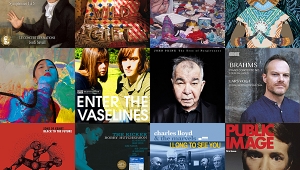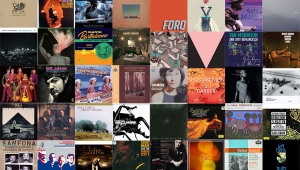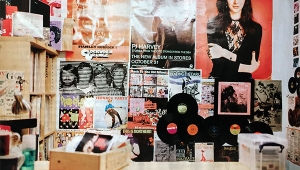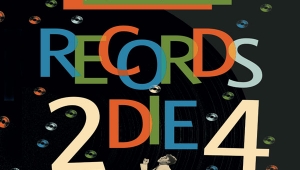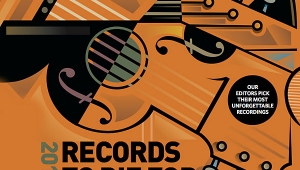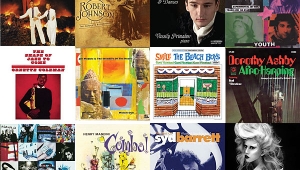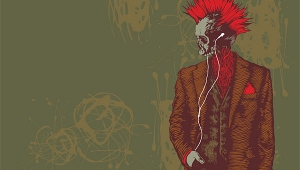| Columns Retired Columns & Blogs |
1999 Records To Die For Page 15
Steve Stolder
JUNIOR WELLS: Hoodoo Man Blues
Delmark D612 (CD). 1965/1991. Robert G. Koestler, Stu Black, engs. AAD? TT: 46:30
Junior Wells and his frequent foil, Buddy Guy, were not known for their restraint. Young turks who served apprenticeships with the Chicago blues élite (both were mentored by Muddy Waters), their tendencies were to take their urban forays into more frenzied directions than their old-guard tutors favored. This peerless collaboration, however, found them meshing their exhibitionist tendencies with uncharacteristic refinement. "Snatch It Back and Hold It" (the perfect opener), "Hound Dog," and "You Don't Love Me" percolate atop the nimble rhythms of bassist Jack Myers and drummer Billy Warren; "Early in the Morning" and "In the Wee Hours" are witching-hour creeps; "We're Ready" and "Chitlin Con Carne" are irresistible instrumental showcases for guitarist Guy and harpist Wells. Taken as a whole, the album is the perfect distillation of big-city '60s blues. (XIV-1, XIX-12)
THE REPLACEMENTS: Let It Be
Twin/Tone 8441 (CD). 1984. Steve Fjelstad, prod., eng.; Paul Westerberg, Peter Jesperson, prods. AAD? TT: 32:56
For a few remarkable years, Minnesota's Replacements managed to balance snottiness with sincerity, in the process putting together a string of LPs that overflowed with exuberance and heart. Let It Be is the best of the lot. Balancing his smart-ass tendencies ("Gary's Got a Boner," "Tommy Gets His Tonsils Out," "Seen Your Video") against post-teen weight-of-the-world ruminations ("Androgynous," "Unsatisfied," "Sixteen Blue," "Answering Machine"), frontman Paul Westerberg came across as the most interesting (and likable) punk to ever come down the pike. Despite the fact that the Mats' crowning achievement is studded with throwaways, there's not a track here that doesn't contribute mightily to making this the best rock album of the '80s.
FRANK ZAPPA: Broadway the Hard Way
Rykodisc RCD 10552 (CD). 1988/1995. Frank Zappa, prod.; Bob Stone, Harry Andronis, engs. DDD. TT: 71:12
Who could have guessed, when Zappa embarked on this 1988 tour backed by one of the best touring bands of his career—including stalwarts Ike Willis, Bruce Fowler, Chad Wackerman, and Scott Thunes—that these would be his last live rock performances? In this light, the album-opening "Elvis Has Just Left the Building" takes on an eerie prescience. This election-year road show was conducted like a burgeoning third-party campaign, complete with voter-registration drives at each show and "zappa for president" bumper stickers. Candidates Pat Robertson and Jesse Jackson were excoriated, respectively, in "Jesus Thinks You're a Jerk" and "Rhymin' Man." Zappa attacked Republican policies from Richard Nixon through then-candidate George Bush in "When the Lie's So Big," with a special dig at Nixon, "Dickie's Such an Asshole." All in all, a fitting swan song from the rock era's greatest musical conceptualist and social critic. (XII-1, 7)
STEVE WESTFIELD: Mangled
Empire Disc 7864 92560 2 (CD). 1994. Steve Westfield, prod.; Steve Barry, prod., eng. AAD. TT: 62:27
Think you know everything about slacker angst? Once upon a time, Steve Westfield was leading the punk band Pajama Slave Dancers and enjoying the carefree life of the town iconoclast in Westfield, Massachusetts, a dying blue-collar municipality whose claim to fame was that it had once been the leading manufacturer of buggy whips. But the breakup of the band, his marriage, and the realization that his life was falling apart led Westfield into the severe depression that enveloped his first solo album, Mangled, and its anthem, "Crummy Little Town." Mangled is without question the most depressive album of the 1990s, a record that makes Neil Young sound like a happy guy. Westfield drains every drop from the cesspool of self-loathing that accompanies a dying relationship, from the denial of "Not Falling" and "Free & Lonely," to the resignation of "Memory Lapse Blues," "Insignificant Other," and "Life (Goes On and On)," to the thirst for self-torture of "Missing," "Floundering," "Destroy Me," and "Electrocute Me." Great stuff.
SCHUBERT: Symphonies 8 ("Unfinished"), 9 ("Great")
Sir Charles Mackerras, Scottish Chamber Orchestra
Telarc CD-80502 (CD). 1998. James Mallinson, prod.; Tony Faulkner, eng. DDD. TT: 79:28
So many great recordings of the Schubert "Great" in the catalog—including those of Kertész, Krips, Szell, and Walter. Add Mackerras to the list, in stunning, up-to-date, 20-bit Telarc sound. Is Tony Faulkner today's finest recording engineer? Maybe. The sound quality is glorious: spacious, coherent, natural-sounding. The 63-member Scottish Chamber Orchestra is large enough to perform the work with sufficient scale, but small enough that the recording has greater transparency than most recorded performances by larger orchestras. With such fine musicians, it's somewhat unfair to single out any one group of players, but the brass section is particularly fine, playing "natural" horns and trumpets. Scotsmen, you know—probably trained on bagpipes. (All the brass players seem to be male.) What makes the performance work is pacing. In lesser hands, Schubert's Ninth can drag, even sag. Not here. A riveting performance, superbly paced from beginning to end.
ALIA MÚSICA: El Canto Espiritual Judeoespanñol
Miguel Sánchez, dir.
Harmonia Mundi Ibérica HMI 987015 (CD). 1998. Pere Casulleras, prod., eng. DDD. TT: 62:30
You don't have to be Jewish to be enthralled by this disc of Judeo-Spanish spiritual songs, most from the "Golden Age" of Jewish culture in Muslim Spain, which ran from the 10th to the 12th centuries. This music "immerses us in the sounds of the soul," writes Miguel Sánchez, director of the group Alia Música, which specializes in medieval Spanish-Jewish repertoire. Its intent is "to establish communication between man and God," and serve as "a form of reconciliation on the part of the people toward their Creator." Only males took an active part in singing the liturgy, but women played a role in folksongs and ballads, where the texts were sung in Ladino (Judeo-Spanish) and instruments were permitted. The ballad "Noche de aljad," which marks the close of the Sabbath, is particularly haunting.
JUNIOR WELLS: Hoodoo Man Blues
Delmark D612 (CD). 1965/1991. Robert G. Koestler, Stu Black, engs. AAD? TT: 46:30
Junior Wells and his frequent foil, Buddy Guy, were not known for their restraint. Young turks who served apprenticeships with the Chicago blues élite (both were mentored by Muddy Waters), their tendencies were to take their urban forays into more frenzied directions than their old-guard tutors favored. This peerless collaboration, however, found them meshing their exhibitionist tendencies with uncharacteristic refinement. "Snatch It Back and Hold It" (the perfect opener), "Hound Dog," and "You Don't Love Me" percolate atop the nimble rhythms of bassist Jack Myers and drummer Billy Warren; "Early in the Morning" and "In the Wee Hours" are witching-hour creeps; "We're Ready" and "Chitlin Con Carne" are irresistible instrumental showcases for guitarist Guy and harpist Wells. Taken as a whole, the album is the perfect distillation of big-city '60s blues. (XIV-1, XIX-12)
THE REPLACEMENTS: Let It Be
Twin/Tone 8441 (CD). 1984. Steve Fjelstad, prod., eng.; Paul Westerberg, Peter Jesperson, prods. AAD? TT: 32:56
For a few remarkable years, Minnesota's Replacements managed to balance snottiness with sincerity, in the process putting together a string of LPs that overflowed with exuberance and heart. Let It Be is the best of the lot. Balancing his smart-ass tendencies ("Gary's Got a Boner," "Tommy Gets His Tonsils Out," "Seen Your Video") against post-teen weight-of-the-world ruminations ("Androgynous," "Unsatisfied," "Sixteen Blue," "Answering Machine"), frontman Paul Westerberg came across as the most interesting (and likable) punk to ever come down the pike. Despite the fact that the Mats' crowning achievement is studded with throwaways, there's not a track here that doesn't contribute mightily to making this the best rock album of the '80s.
![]()
John Swenson
FRANK ZAPPA: Broadway the Hard Way
Rykodisc RCD 10552 (CD). 1988/1995. Frank Zappa, prod.; Bob Stone, Harry Andronis, engs. DDD. TT: 71:12
Who could have guessed, when Zappa embarked on this 1988 tour backed by one of the best touring bands of his career—including stalwarts Ike Willis, Bruce Fowler, Chad Wackerman, and Scott Thunes—that these would be his last live rock performances? In this light, the album-opening "Elvis Has Just Left the Building" takes on an eerie prescience. This election-year road show was conducted like a burgeoning third-party campaign, complete with voter-registration drives at each show and "zappa for president" bumper stickers. Candidates Pat Robertson and Jesse Jackson were excoriated, respectively, in "Jesus Thinks You're a Jerk" and "Rhymin' Man." Zappa attacked Republican policies from Richard Nixon through then-candidate George Bush in "When the Lie's So Big," with a special dig at Nixon, "Dickie's Such an Asshole." All in all, a fitting swan song from the rock era's greatest musical conceptualist and social critic. (XII-1, 7)
STEVE WESTFIELD: Mangled
Empire Disc 7864 92560 2 (CD). 1994. Steve Westfield, prod.; Steve Barry, prod., eng. AAD. TT: 62:27
Think you know everything about slacker angst? Once upon a time, Steve Westfield was leading the punk band Pajama Slave Dancers and enjoying the carefree life of the town iconoclast in Westfield, Massachusetts, a dying blue-collar municipality whose claim to fame was that it had once been the leading manufacturer of buggy whips. But the breakup of the band, his marriage, and the realization that his life was falling apart led Westfield into the severe depression that enveloped his first solo album, Mangled, and its anthem, "Crummy Little Town." Mangled is without question the most depressive album of the 1990s, a record that makes Neil Young sound like a happy guy. Westfield drains every drop from the cesspool of self-loathing that accompanies a dying relationship, from the denial of "Not Falling" and "Free & Lonely," to the resignation of "Memory Lapse Blues," "Insignificant Other," and "Life (Goes On and On)," to the thirst for self-torture of "Missing," "Floundering," "Destroy Me," and "Electrocute Me." Great stuff.
![]()
Sam Tellig
SCHUBERT: Symphonies 8 ("Unfinished"), 9 ("Great")
Sir Charles Mackerras, Scottish Chamber Orchestra
Telarc CD-80502 (CD). 1998. James Mallinson, prod.; Tony Faulkner, eng. DDD. TT: 79:28
So many great recordings of the Schubert "Great" in the catalog—including those of Kertész, Krips, Szell, and Walter. Add Mackerras to the list, in stunning, up-to-date, 20-bit Telarc sound. Is Tony Faulkner today's finest recording engineer? Maybe. The sound quality is glorious: spacious, coherent, natural-sounding. The 63-member Scottish Chamber Orchestra is large enough to perform the work with sufficient scale, but small enough that the recording has greater transparency than most recorded performances by larger orchestras. With such fine musicians, it's somewhat unfair to single out any one group of players, but the brass section is particularly fine, playing "natural" horns and trumpets. Scotsmen, you know—probably trained on bagpipes. (All the brass players seem to be male.) What makes the performance work is pacing. In lesser hands, Schubert's Ninth can drag, even sag. Not here. A riveting performance, superbly paced from beginning to end.
The accompanying "Unfinished," if not a performance to displace Kertész with the Vienna Philharmonic, is also fine. Again, the brass are phenomenal—you should hear this through a single-ended amp! Adding the "Unfinished" makes for an exceedingly generous disc just seconds shy of 80 minutes long. One of the finest Telarc recordings ever!
ALIA MÚSICA: El Canto Espiritual Judeoespanñol
Miguel Sánchez, dir.
Harmonia Mundi Ibérica HMI 987015 (CD). 1998. Pere Casulleras, prod., eng. DDD. TT: 62:30
You don't have to be Jewish to be enthralled by this disc of Judeo-Spanish spiritual songs, most from the "Golden Age" of Jewish culture in Muslim Spain, which ran from the 10th to the 12th centuries. This music "immerses us in the sounds of the soul," writes Miguel Sánchez, director of the group Alia Música, which specializes in medieval Spanish-Jewish repertoire. Its intent is "to establish communication between man and God," and serve as "a form of reconciliation on the part of the people toward their Creator." Only males took an active part in singing the liturgy, but women played a role in folksongs and ballads, where the texts were sung in Ladino (Judeo-Spanish) and instruments were permitted. The ballad "Noche de aljad," which marks the close of the Sabbath, is particularly haunting.
I wish more was said in the notes about the instruments, which are used to striking effect in "Dodi yarad legano," a 17th-century Hebrew liturgical poem that takes the form of an amorous dialog between God and the people of Israel. The recording has exceptional clarity and immediacy.
- Log in or register to post comments

